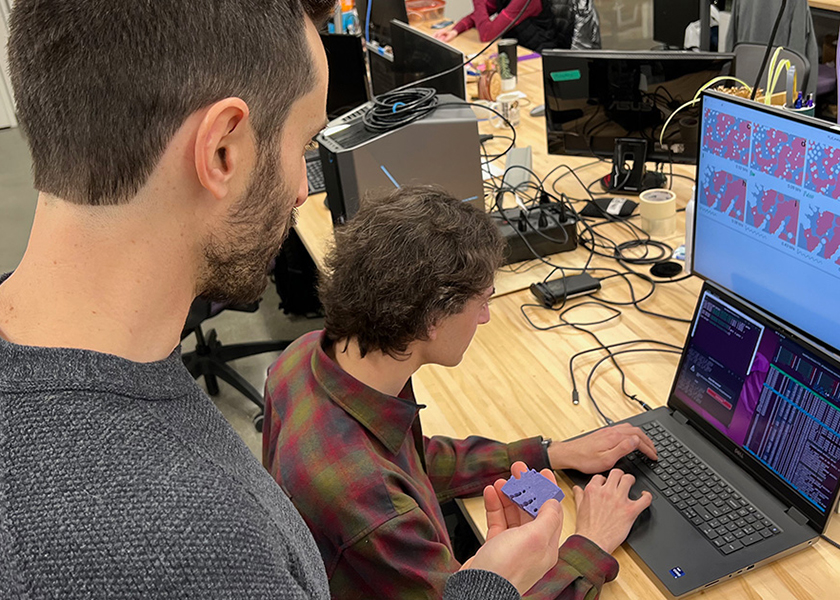Sam Kriegman Receives Prestigious NSF CAREER Award
The award supports the advancement of evolutionary robotics
Northwestern Engineering’s Sam Kriegman has received a Faculty Early Career Development Program (CAREER) award from the US National Science Foundation (NSF), the foundation’s most prestigious honor for junior faculty members.
 Kriegman is an assistant professor of computer science, chemical and biological engineering, and mechanical engineering. He joined Northwestern in 2022 after completing a postdoctoral fellowship in the biology department at Tufts University and the Wyss Institute for Biologically Inspired Engineering at Harvard University. He earned a PhD in computer science and the Outstanding Doctoral Dissertation Award from the University of Vermont in 2020.
Kriegman is an assistant professor of computer science, chemical and biological engineering, and mechanical engineering. He joined Northwestern in 2022 after completing a postdoctoral fellowship in the biology department at Tufts University and the Wyss Institute for Biologically Inspired Engineering at Harvard University. He earned a PhD in computer science and the Outstanding Doctoral Dissertation Award from the University of Vermont in 2020.
The CAREER program supports the early-career development of academic role models in research and education who lead advances in the mission of their department or organization. The award is intended to build a firm foundation for a lifetime of leadership in integrating education and research.
Kriegman will receive $576,083 over five years from NSF’s Directorate for Computer and Information Science and Engineering Division of Information and Intelligent Systems for his project titled “Differentiable Evolution: Efficient Automatic Design of Embodied Intelligence.” The work will focus on designing robots in a scalable manner using error tracing algorithms that automatically identify body parts responsible for poor behavior and efficiently revise them to improve the robot’s fitness.
By generalizing the error tracing techniques of learning in artificial neural networks to the evolution of robots, Kriegman and his team in the Xenobot Lab aim to develop novel robots with important new capabilities that are difficult or impossible to design by hand.
“Computers and software are all around us, and they are changing how we work, eat, relax and interact with each other. But where are all the robots that science fiction promised us?” Kriegman said. “Autonomous robots have yet to step out of factories and into the real world because they are surprisingly difficult to design.”

Through the CAREER award, Kriegman will investigate the extent to which freeform robot design can be represented in a way that simplifies error tracing and thereby accelerates the discovery of robots that are better adapted to their environment than human-designed robots. He intends to demonstrate how this computational approach can lead to innovative, nonobvious body plans that advance the state-of-the-art in adaptive robots that function in terrestrial and arboreal task environments.
“Roboticists have no idea how to manually design a robot as athletic and intelligent as even the simplest animals,” Kriegman said. “We could take inspiration from the evolutionary design of animals. But we will need to make the basic Darwinian algorithm much more efficient, or we will be waiting millions of years for good robots to evolve.”
To illustrate the project’s research process and crowdsource potential designs, Kriegman and his team also plan to develop an interactive robot design game.
“We hope this can provide a kid-friendly introduction to aspects of ecology, neuroscience, robotics and biomechanics, in which users discover how evolution works through play,” Kriegman said. “Although our error-tracing algorithms with their capacity to look ahead depart from the blind process of biological evolution, its careful use can help kids quickly visualize the cumulative and gradual nature of evolution. Once kids see how a chain of small changes can yield whole new body plans and behaviors, they are well positioned to learn about the many details missing from this very high-level abstraction of evolution.”
Kriegman is best known for his 2020 work that introduced the world’s first computer-designed organisms called xenobots, living robots made entirely from biological cells. In 2023, continuing to push the frontiers of artificial life, Kriegman led the team that developed the first AI capable of intelligently designing robots from scratch. The CAREER award will help Kriegman and his lab expand this line of research to increasingly athletic and intelligent machines.